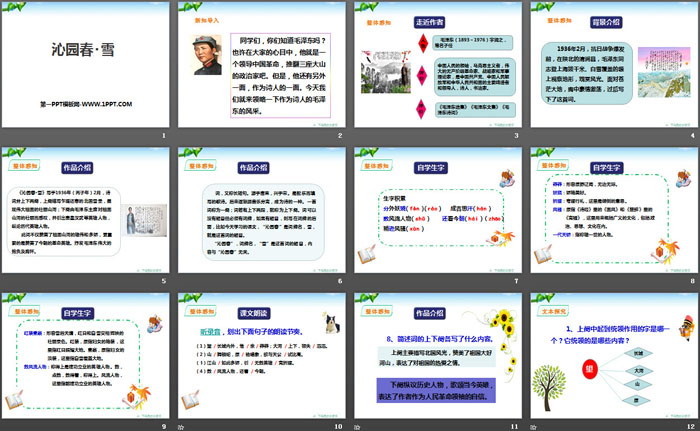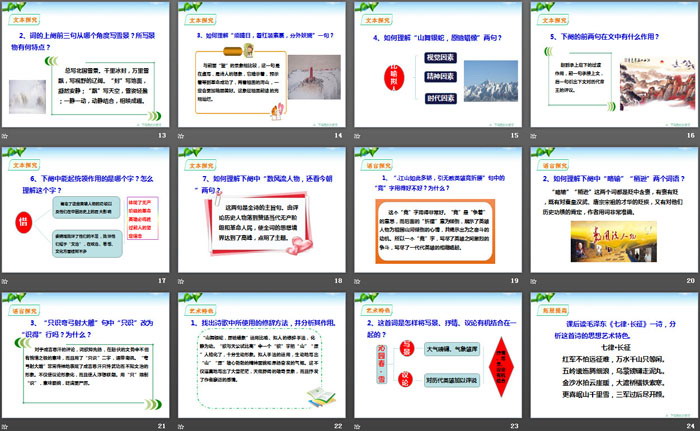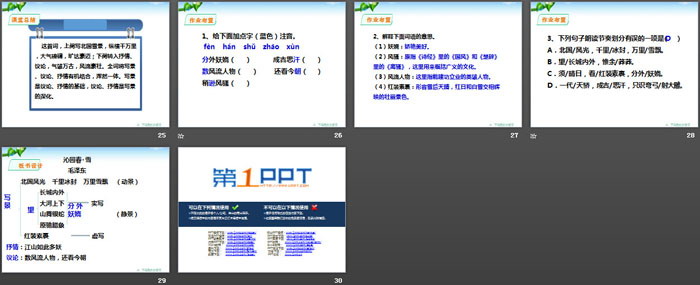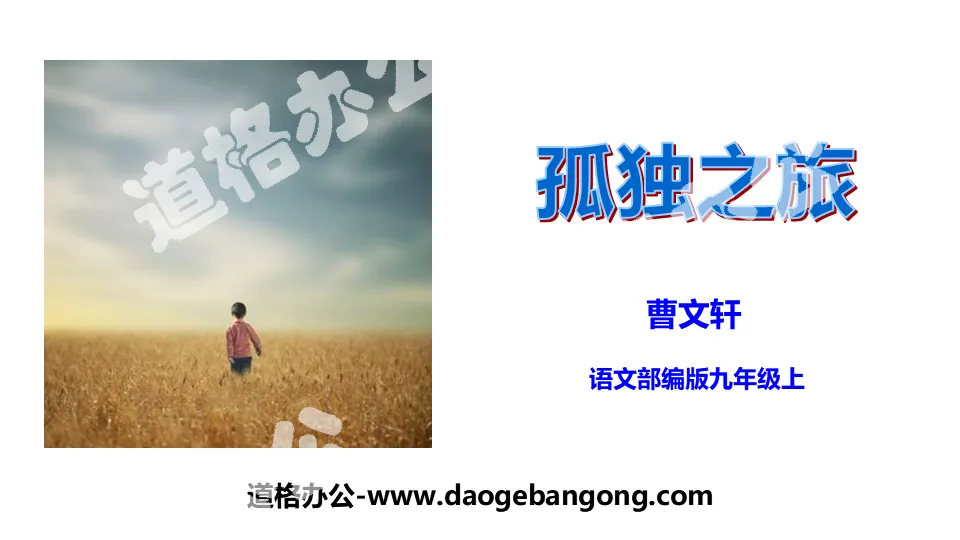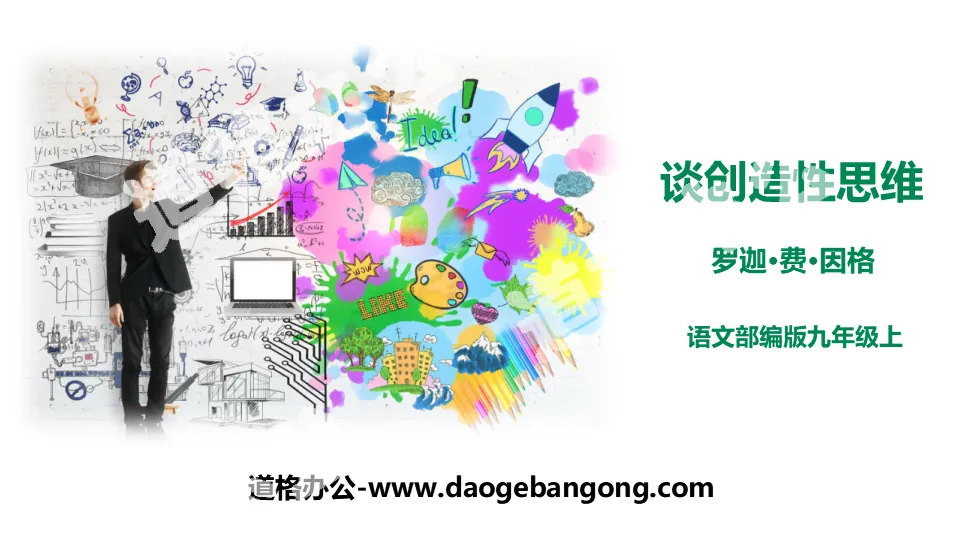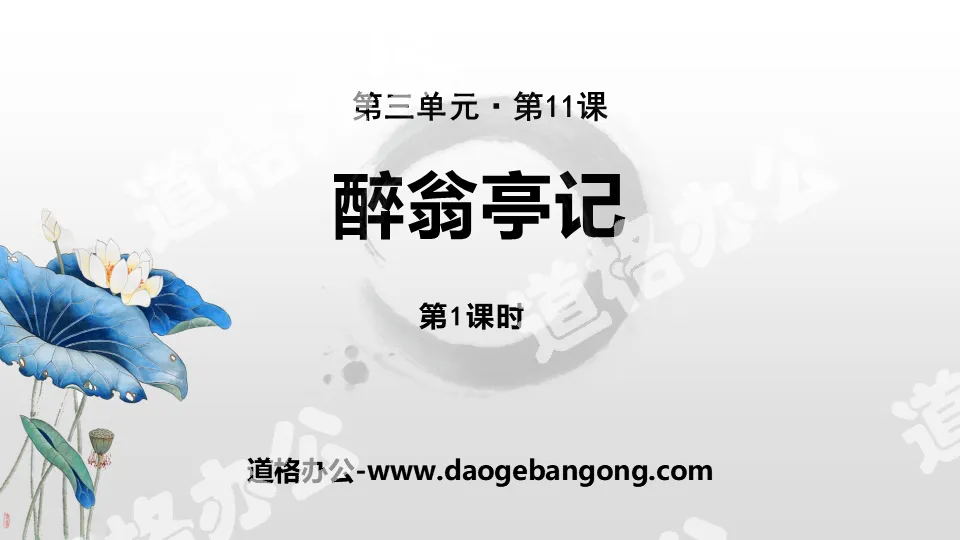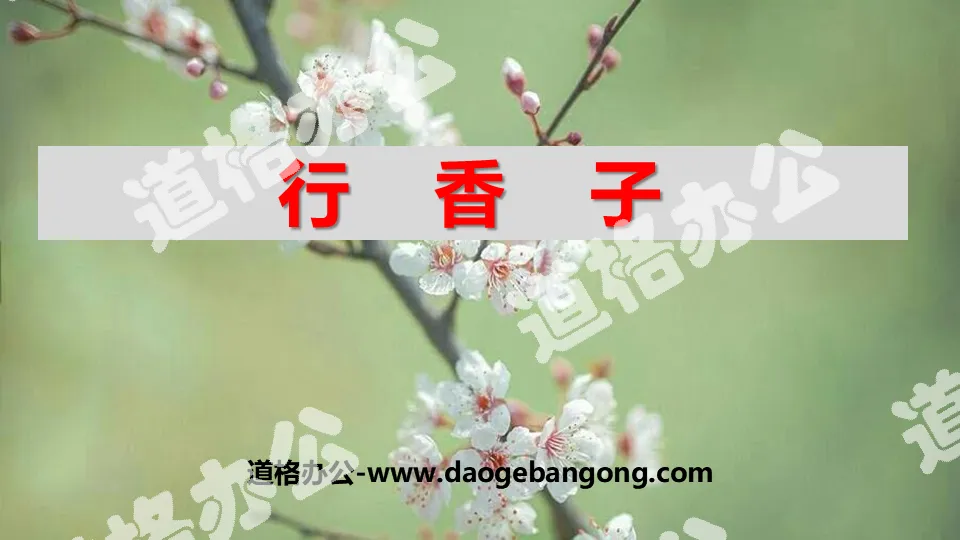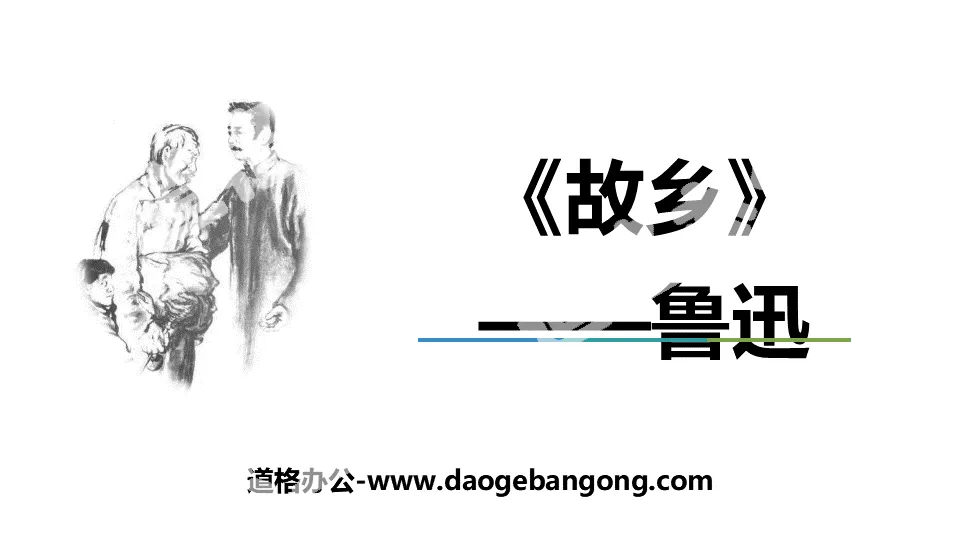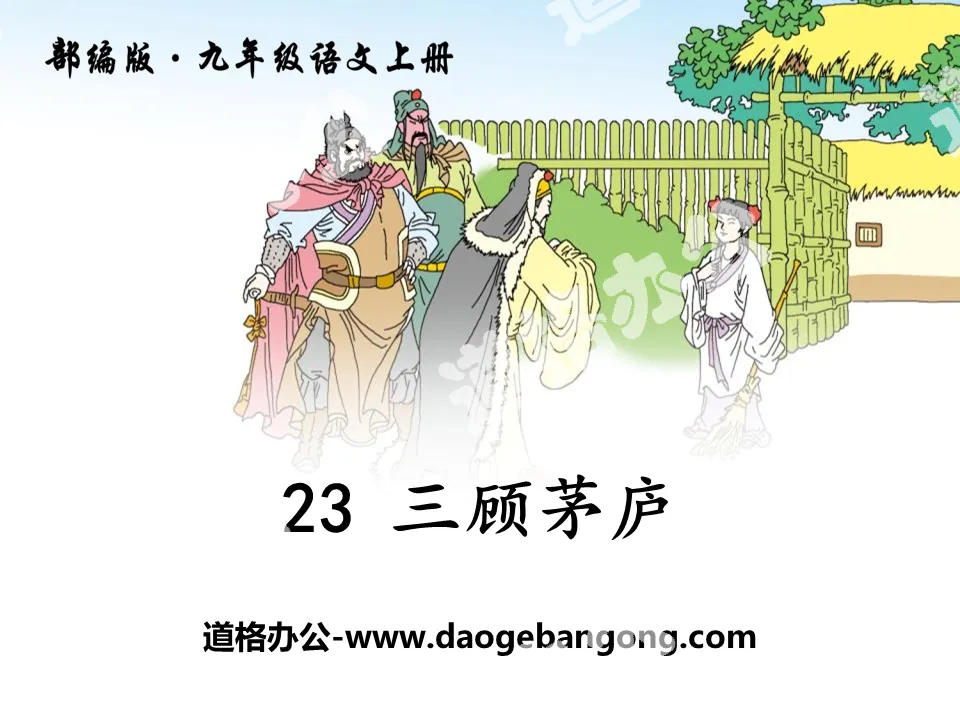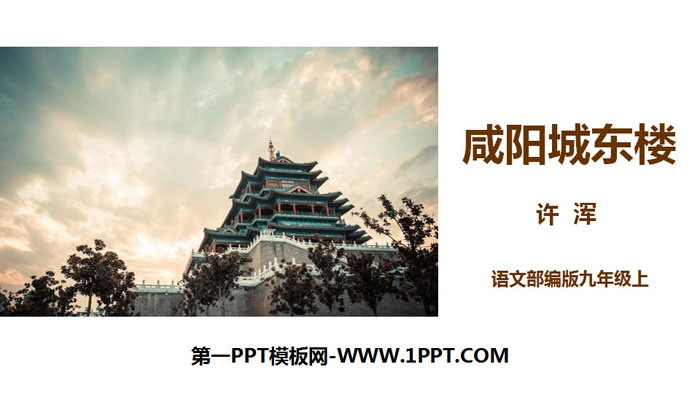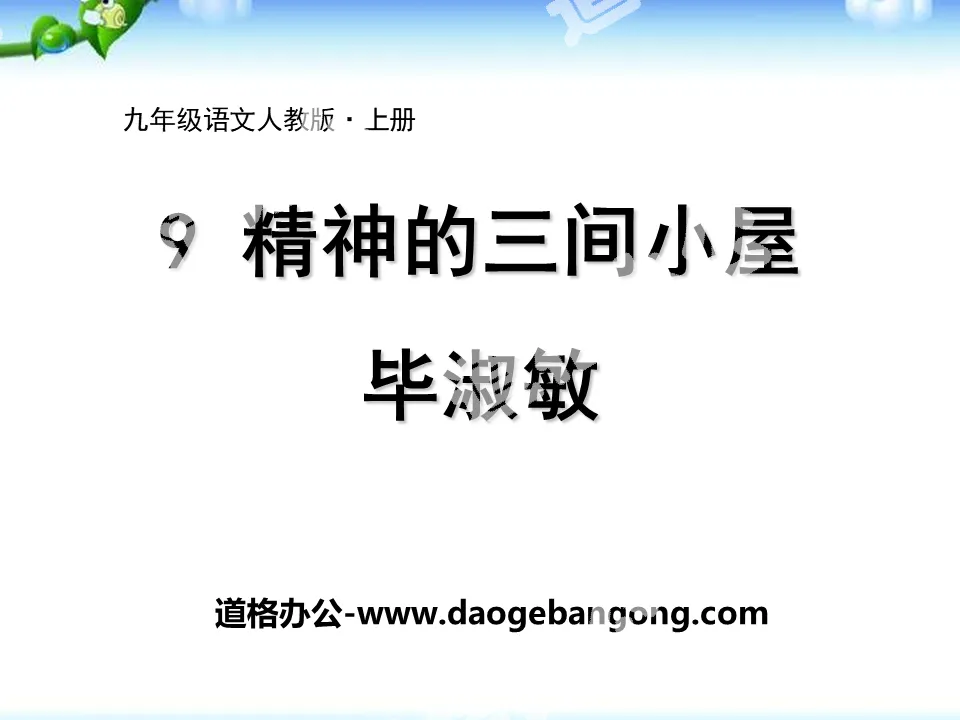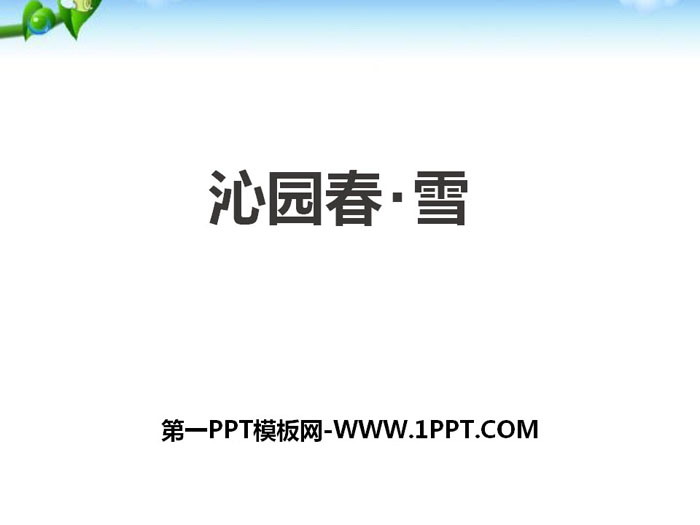
| Category | Format | Size |
|---|---|---|
| The first volume of ninth-grade Chinese compiled by the People's Education Publishing House | pptx | 6 MB |
Description
"Qinyuan Spring·Snow" PPT
Part One: Introduction of New Knowledge
Students, do you know Mao Zedong? Perhaps in everyone's minds, he is a politician who led the Chinese revolution and overthrew three mountains. But there was another side to him, the side as a poet. Today we will take a look at Mao Zedong as a poet.
Get closer to the author
Mao Zedong (1893-1976) was known by his pseudonym Runzhi and his pseudonym Ziren.
The leader of the Chinese people, a Marxist, a great proletarian revolutionist, strategist and military theorist, the main founder and leader of the Communist Party of China, the Chinese People's Liberation Army and the People's Republic of China, a poet, and a calligrapher.
"Selected Works of Mao Zedong", "Collected Works of Mao Zedong", "Poems of Mao Zedong"
Qinyuan Chunxue PPT, part 2: background introduction
In February 1936, before the outbreak of the Anti-Japanese War, Comrade Mao Zedong climbed to a snow-covered plateau thousands of meters above sea level in Qingjian County in northern Shaanxi to inspect the terrain and admire the scenery. Facing the vast land, my heart was filled with pride, and I wrote this poem afterwards.
Introduction of works
"Qinyuan Spring·Snow" was written in February 1936 (Bingzi year). The poems are divided into two parts. The upper part describes the snow scene in the north that turns warm and cold, showing the magnificent mountains and rivers of the great motherland; the lower part is written by Chairman Mao Zedong. The magnificence of mountains and rivers makes people sigh, and leads to heroes such as Emperor Qin, Emperor Wu of Han, etc., and the heroes of the past dynasties are discussed.
This word not only praises the majesty and beauty of the mountains and rivers of the motherland, but more importantly, praises the current revolutionary heroes. Express Mao Zedong's great ambition and mind.
Words, also known as long and short sentences. It originated in the late Tang Dynasty and flourished in the Song Dynasty. It is a song and poem filled in with music. Later, it gradually separated from music and became a kind of poetry. A word is called a line; if the word has two sections, it is called an upper and lower line. The word can have no title but must have a word plate. If there is a title, it will be written behind the word plate. For example, in the text we studied today, "Qinyuanchun" is the name of the word plate, and "Xue" is the title of this word.
"Qinyuanchun" is the name of the poem. "Snow" is the title of this poem, and the content has nothing to do with "Qinyuanchun".
Qinyuan Chunxue PPT, the third part of the content: self-taught calligraphy
Accumulation of new words
Extraordinarily enchanting ( fèn ) ( ráo ) Genghis Khan ( hán )
Count the famous people (shǔ) and look at the current situation (hái) (zhāo)
Slightly less coquettish (xùn)
Mangmang: describes the vastness and boundlessness of the wilderness.
Enchanting: charming and beautiful.
Zhenyao: bend down to salute, here it means to lean over.
Coquettish: Originally refers to "Guofeng" in "The Book of Songs" and "Li Sao" in "Chu Ci". It is used here to summarize culture in a broad sense, including politics, thought, and culture.
Genius of a generation: refers to a person who dominates the world.
Qinyuan Chunxue PPT, the fourth part: text exploration
1. Which word plays a leading role in the upper column? What content does it govern?
2. From what angle do you write the snow scene in the first three sentences of the poem? What are the characteristics of the scenery written about?
I always write about snow scenes in the North. Thousands of miles of ice, thousands of miles of snow drifting, describe the vastness of the horizon. "Feng" describes the ground, which is condensed and quiet; "Floating" describes the sky, which is light and snowy; one is still and the other is moving, the movement and stillness are combined to form an interesting contrast.
3. How do you understand the sentence "On a sunny day, seeing red clothes and plain clothes is particularly enchanting"?
Compared with the scene of "looking" in front of it, this sentence is fictitious and is the poet's imagination. It implies and indicates that when the revolution is successful, the mountains and rivers of the motherland will definitely be more beautiful and beautiful. This symbolizes the bright future of the motherland.
Qinyuan Chunxue PPT, Part 5: Language Exploration
1. Is the word "vie" used well in the sentence "The country is so beautiful that countless heroes compete to bend it"? Why?
The word "compete" is used very well. "Jing" means "fighting", and the word "zhenyao" behind it means falling, which shows the hero's mood of falling for the mountains and rivers of the motherland and reveals the motivation for fighting for it. Therefore, the word "competition" describes the fierce battles between heroes and the rise of successive generations of heroes.
2. How to understand the two words "slightly inferior" and "slightly inferior" in the next column?
The words "slightly lost" and "slightly inferior" are both derogatory and complimentary, with both praise and derogation. They are both derogatory to the talents of Emperor Qin, Han Wu, Tang Zong and Song Zu, and they are also affirmative of their historical achievements. The author uses The words are very precise.
3. In the sentence "I only know how to bend the bow and shoot the big eagle", is it OK to change "only know" to "know how"? Why?
Regarding Genghis Khan's comments, the words tend to be restrained but first raised. In the ups and downs of the writing, there is not only a sense of extreme regret, but also the use of the word "only knowledge", which is ironic. "Bend the bow and shoot the big eagle" very vividly expresses the image of Genghis Khan who only relies on martial arts and does not know about civilized affairs. It not only visualizes the discussion, but also makes people think about it. Using "only" to limit "knowledge" means euphemism, and relegation is more severe.
Qinyuan Chunxue PPT, Part Six: Artistic Features
1. Find out the rhetorical methods used in poetry and analyze their functions.
"Silver snakes dance in the mountains, wax figures originally ride" uses metaphors and personification to turn stillness into movement. The word "desire" in "Desire to compete with God" personifies "mountain" and "origin", which is very vivid. The use of anthropomorphic techniques vividly depicts the ambitious mental outlook and high-spirited spirit of "Mountain" and "Yuan". This not only vividly describes the majestic scene of heavy snow, low sky and vast fields, but also expresses the author's heroic feelings.
2. How does this poem organically combine scene description, lyricism, and discussion?
Qinyuan Chunxue PPT, Part 7: Class Summary
The upper part of this poem describes the snowy scenery of the North, which stretches thousands of miles across, is majestic, broad-minded and heroic; the lower part turns to lyricism and discussion, which is eternally majestic and romantic. The whole poem organically combines scene description, discussion, and lyricism into a seamless whole. Scenery description is the basis of discussion and lyricism, and discussion and lyricism are the deepening of scenery description.
Qinyuan Chunxue PPT, Part 8: Homework assignments
1. Add Braille (blue) phonetic notation below.
Extraordinarily enchanting ( ) Genghis Khan ( )
Counting the romantic figures ( ) Also look at the present ( )
Less coquettish ( )
2. Explain the meaning of the following words.
(1) Enchanting: charming and beautiful.
(2) Coquettish: Originally refers to "Guofeng" in "The Book of Songs" and "Li Sao" in "Chu Ci". It is used here to summarize culture in a broad sense.
(3) Heroic figures: This refers to heroes who can make great achievements.
(4) Wrapped in red: It describes the magnificent scenery of clear skies after snow, with the red sun and white snow complementing each other.
3. Which of the following sentences has an incorrect reading rhythm division? ( )
A. Northern country/scenery, thousands of miles/frozen, thousands of miles/snow drifting.
B. Looking inside and outside the Great Wall, there is nothing left but vastness.
C. It must be a clear day and you can see the red dress and plain clothes, which is particularly enchanting.
D. A generation of genius, Genghis Khan, only knew how to bend a bow and shoot a giant eagle.
Keywords: Free download of Chinese PPT courseware for the first volume of the ninth grade of the People's Education Press version, Qinyuan Chunxue PPT download, .PPT format;
For more information about the "Qinyuan Spring Snow" PPT courseware, please click on the "Qinyuan Spring Snow" PPT tab.
"Qinyuan Spring·Snow" PPT excellent courseware:
"Spring Snow in Qinyuan" PPT Excellent Courseware Part One: Introduction to the Author Mao Zedong, whose courtesy name is Runzhi and whose pen name is Ziren. A native of Xiangtan, Hunan. Poet, great Marxist, proletarian revolutionist, strategist and theorist, member of the Communist Party of China and the Chinese People's Liberation Army..
"Qinyuan Spring·Snow" PPT free download:
"Spring Snow in Qinyuan" PPT free download Part 1: Learning objectives 1. Read the text emotionally and read out the heroic momentum. 2. Taste the language of poetry and improve students’ poetry appreciation ability. 3. Understand the author’s admiration for the mountains and rivers of the motherland, and the proletarian...
"Qinyuan Spring·Snow" PPT download (Lesson 2):
"Spring Snow in Qinyuan" PPT download (Lesson 2) Part One: Learning Objectives 1. Understand the writing method that combines description of scenery, discussion and lyricism, and feel the beautiful language. 2. Compare and read poems about snow scenes to deepen your understanding of the theme of this poem. 3. Take an objective look at the poet’s views on the past dynasties..
File Info
Update Time: 2024-07-02
This template belongs to Chinese courseware The first volume of ninth-grade Chinese compiled by the People's Education Publishing House industry PPT template
"Qinyuan Spring·Snow" PPT Simple campus recruitment activity planning plan summary enterprise and institution recruitment publicity lecture PPT template is a general PPT template for business post competition provided by the manuscript PPT, simple campus recruitment activity planning plan summary enterprise and institution recruitment promotion Lecture PPT template, you can edit and modify the text and pictures in the source file by downloading the source file. If you want more exquisite business PPT templates, you can come to grid resource. Doug resource PPT, massive PPT template slide material download, we only make high-quality PPT templates!
Tips: If you open the template and feel that it is not suitable for all your needs, you can search for related content "Qinyuan Spring·Snow" PPT is enough.
How to use the Windows system template
Directly decompress the file and use it with office or wps
How to use the Mac system template
Directly decompress the file and use it Office or wps can be used
Related reading
For more detailed PPT-related tutorials and font tutorials, you can view: Click to see
How to create a high-quality technological sense PPT? 4 ways to share the bottom of the box
Notice
Do not download in WeChat, Zhihu, QQ, built-in browsers, please use mobile browsers to download! If you are a mobile phone user, please download it on your computer!
1. The manuscript PPT is only for study and reference, please delete it 24 hours after downloading.
2. If the resource involves your legitimate rights and interests, delete it immediately.
3. Contact information: service@daogebangong.com
"Qinyuan Spring·Snow" PPT, due to usage restrictions, it is only for personal study and reference use. For commercial use, please go to the relevant official website for authorization.
(Personal non-commercial use refers to the use of this font to complete the display of personal works, including but not limited to the design of personal papers, resumes, etc.)
Preview

